- Home
- Glynn Stewart
Sword of Mars Page 7
Sword of Mars Read online
Page 7
She smiled.
“Given that you are, as you said, the most junior officer in the fleet, that experience will serve you well.”
The job didn’t sound fun at all, though Roslyn could certainly see the value of it for Alexander.
“A lot of this is better experience for you than it might sound,” the Admiral pointed out, “and it’s going to suck up more time than you can possibly imagine. What will make it worse is that I will expect you to sit in on all of my meetings, double-checking that the dictation software is taking minutes correctly, making sure the stewards know if we need more coffee or food, and generally keeping your mouth shut. A Flag Lieutenant should be neither heard nor noticed.”
That…didn’t sound like herself at all to Roslyn, but she could probably make it work.
“That’s the key parts of your official duties,” Alexander continued. “Your unofficial job will be to keep track of everything going on in all of those meetings, everything going on in the fleet, and giving me your honest opinion of everything that I’m being told.
“In private, obviously,” she added. “I just had a cold and harsh awakening as to my need for a second opinion on even what my staff tells me. People died, Lieutenant Chambers, because I trusted my ops officer and didn’t have anyone else to give me their point of view.
“That’s going to be your job,” she concluded. “Everyone is going to see you as my shadow at best, but I want your eyes and your ears open as we go through everything, and I want your opinion on everything we deal with.
“The worst case will be that I don’t have time to explain why you’re wrong and delegate that to Captain Kulkarni,” Alexander said gently. “The best case is that you see something I’ve missed and your observations save lives.”
Roslyn swallowed hard.
“No pressure, huh?” she asked softly.
“The pressure is on me, Lieutenant,” the Mage-Admiral pointed out. “Your job from here on out is to help me survive that pressure. Understand?”
“I think so, sir.”
“Can you do it?” Alexander asked.
Roslyn felt a shiver of fear and anxiety run down her spine, but she met Alexander’s gaze levelly.
“Honestly, sir? The hardest part is going to be keeping my mouth shut in the meetings,” she admitted. “I assume you know about my history?”
“If you mean the bits about being a juvenile delinquent and your jail stint that aren’t in your official record?” the Admiral replied. “Yes. Believe me, Lieutenant, I am very familiar with the mindset of a daughter of a privileged family raising hell to get someone—anyone—to pay actual attention to them.”
She grinned.
“I’m just old enough that everyone has forgotten my petty thefts by now!”
12
“Welcome to the Arsenault System,” Liara Foster said in an exhausted but cheerful voice after completing the jump.
“I’m going to go fall over. Have fun, kids.”
Damien snorted at the Jump Mage and gave her a casual wave as she drifted out of the zero-gravity simulacrum chamber. He was using magic to keep himself anchored to one of the railings in the room.
The chamber had the best access to Starlight’s sensors of anywhere aboard ship. There was a reason that Navy warships, which needed to know what was going on at all times, put the bridge in the simulacrum chamber—and Starlight had followed that design.
With Foster on her way to her quarters, Damien was the only Mage in the rune-encrusted chamber. He lacked the runes to interface with the jump matrix, though, so it wasn’t like he could jump the ship anywhere.
Damien was a Rune Wright, one of the extraordinarily rare Mages who could see the flow of magic. Floating in the simulacrum chamber, he could watch the flow of energy through the jump matrix. He could also see where the matrix was ever so slightly wrong, the spots in the rune sequences that filtered energy to make sure the jump matrix could only be used to jump starships.
The core of a jump matrix and a military-grade amplifier matrix were identical. The same runes, the same functions, the same sequences. A jump matrix was actually more complicated, because there were extra matrices woven through the runes that negated any spell except the one it was designed for.
As a very young Mage who hadn’t known any better, Damien had worked out how to turn a jump matrix into an amplifier. The consequences of that had ended up with the largest criminal organization in the Protectorate in pieces and Damien as a Hand of the Mage-King of Mars.
While running from authorities and criminals alike, however, he’d visited Legatus. Niska had then seen him deliver gunships to Chrysanthemum, another UnArcana World.
That made Manchester, Arsenault’s habitable planet, the third UnArcana World he’d visited. Like most, it was more industrialized than an equivalent world that used magic. Massive fusion power plants and solar-panel arrays were positioned in geostationary orbits above Arsenault’s equator, with forty-thousand-kilometer-long cables running power to the planetary grid.
A Protectorate world would have used antimatter power plants with magical safeguards to provide the same power in a far safer and more efficient manner. Without Mages to produce the antimatter or safeguard the plants, however, UnArcana Worlds went for fusion on a mass scale.
Even as Damien watched, a two-megaton tanker decelerated into Manchester orbit to dock at one of the huge power stations. Tracing the ship’s course back, he nodded as he saw several other tankers on a probably permanent cycle between the cloudscoops on the inner gas giant and the power plants in orbit of Manchester.
Gunships of an unfamiliar design escorted those transports. These weren’t the mass-produced Republic ships that the RIN’s carriers were using to cause terror across the frontlines. They were older ships, probably built by Arsenault before the Secession.
A collection of more-familiar gunships made up a defensive cloud around Manchester. Presumably, some of the stations in orbit were support platforms for the short-range vessels, but Damien could pick out thirty of the ships scattered around the planet.
There were two more rocky worlds inside Manchester’s orbit, and it looked like the closer of them was being strip-mined to support Manchester’s industries. Like the tankers coming from the gas giants in the outer systems, there was a scattered but consistent chain of freighters pulling ore toward the orbital refineries.
For all of the orbital industry, however, the planet they were heading for was almost pristine. His files said that the climate was chilly for a habitable planet and most of the population was around the equator, which simplified the power grid and made the orbital plants practical.
Over two hundred million people called the Arsenault System home. On average, that meant that there was probably a dozen or so Mages by Right being born on the planet each year.
Since the Secession, those kids weren’t being identified—and that might be for the best.
Damien was, after all, there to find out what had happened to the children who had already been identified as Mages.
“All right,” Captain Maata said calmly in a small meeting room several hours later. “I’ve made contact with my usual buyers and sellers, and have started the delicate dance of selling and replacing a spec cargo.”
She shook her head at Damien and Niska, the only other occupants of the room
“From the tone of those conversations, stretching out our visit here is going to be harder than I anticipated,” she warned. “I think I’m going to make this an R&R stop. They’ve done a good job of keeping Manchester’s natural habitat preserved, so the planet has some nice resorts.
“If I cycle my crew through a week off each, that should get us the two weeks I promised. Beyond that, though…” She spread her hands. “If I’ve run my entire crew through a week’s vacation apiece and my cargo spars are full, people are going to get suspicious if I’m not moving.”
“We could fake an engineering casualty,” Niska suggested.
“I
t’s a possibility, but we’re already close enough in that ‘faking’ is going to look a lot like ‘causing’,” Maata told him. “I’m not breaking my ship for you, James, not without a damn good reason.”
“If we’d have to trigger an actual problem, our best timing on that would be to do so as Starlight is leaving orbit,” Damien cut in, trying to cut off any potential argument. “If we hit the end of two weeks and we’re sufficiently on the trail that we need more time, well…then we can talk about breaking Starlight to buy that time.
“We don’t need it before then.”
The Captain grumbled but nodded.
“All right. I’ll leave you two to the cloak-and-dagger,” she told them. “I’m just the driver. I don’t think I want to know what you’re getting up to.”
She rose and walked out, leaving Damien alone with Niska.
The Hand leveled his gaze on the cyborg and made an inquiring gesture.
“All I know about Arsenault is the basic encyclopedia entry and a review of our scan data,” he pointed out. “Where do we start poking?”
For that matter, Damien didn’t even know what moving around on a Republic world looked like. On a Protectorate world, the platinum fist he wore on his chest opened every door. It wasn’t going to do the same here.
“Getting close to the school won’t be particularly difficult,” Niska told him. “We’ll shuttle down with Maata’s crew and rent a vehicle. It’s close to a bunch of those resorts she mentioned, so no one is going to question us driving out in that direction.
“The school itself was only ever accessible by air or by foot, so we’ll make our way in quietly once we’re close enough, but we can get close without drawing attention.”
“All right,” Damien agreed. “And backup?”
“I figure we bring your Romanov and my O’Malley,” Niska said. Harlow O’Malley was the redheaded Augment who’d been with him when they’d boarded Starlight.
Damien wasn’t sure if O’Malley had been a direct LMID agent or more like Maata, an LMID “asset” positioned in another service. He was certain that her main role now was keeping the old Augment spy alive.
Two Augments, a Combat Mage and a Hand should be enough to deal with any trouble they encountered, regardless of how crippled said Hand was.
“Romanov and I have ways to make sure we aren’t recognized,” he pointed out. “What about you and O’Malley?”
“O’Malley is a nobody by any grand standard,” Niska replied. “She’s a retired Augment Corps NCO, not an LMID agent, not a spy or an assassin.
“I have built-in hardware to change my features, but we’re also probably going to need some of my access to pull this off. I checked once we were in system—my codes appear to still be good.”
“And what happens when they stop being good?” Damien asked.
“We fight our way out,” the Augment admitted. “There’s more than one reason I’m bringing you, my lord Hand.”
13
Manchester’s major city was named Arndale. Like the rest of the planet’s major settlements, it was on the equator. In Arndale’s case, it was built around—and over—a massive river that flowed toward the sea from one of the planet’s largest mountain ranges.
Even in what Damien’s wrist-comp told him was a city of fifteen million people, Manchester’s determination to maintain a balance with the ecology was clear. Arndale sprawled for dozens of kilometers in every direction, but part of the reason for that was the massive greenbelt spaces laced throughout the city.
The Great Medlock River was nearly six hundred meters wide as it passed through the city, and the designers had been unwilling to give up that space. Carefully buttressed structures swept out over the river, creating grand and graceful thoroughfares that crossed the water.
Later architects had followed the same concept and added entire neighborhoods suspended above the river, with glittering glass-and-concrete structures rising above the water to provide homes for Arndale’s wealthy and crazy.
There were six separate shuttle ports scattered throughout the city, and O’Malley brought them in at the one closest to the mountain range. Their destination wasn’t in the big mountains, as Damien understood it, but in an off-spur range still within a day’s drive of Arndale.
“Everything’s checked and paid for,” the Augment reported as she stepped back into the main compartment. “Our cargo will be picked up by its recipient, and one of Maata’s people will take the shuttle back up once that’s done.”
“All right, Niska, this is your show,” Damien conceded. “What’s the plan?”
“First step, we grab a taxi and get to a hotel,” Niska replied. “Officially, we’re part of Maata’s crew on leave, so let’s look the part.”
“From the hotel, we can get into the datanet,” Romanov said. “I don’t know about you three, but I want a better lay of the land before we go poking hornets’ nests.”
“We should pass without much notice so long as no one goes firing off magic where everyone can see it,” the Augment replied distractedly, checking something on his wrist-comp.
Both Damien and Romanov had “lost” their usual medallions and the attached collars. Careful makeup work had even covered up the tan line where a portion of their skin had always been covered from the light in the past.
Most of their changed appearance, however, was a sustained spell. Damien couldn’t do much about his own diminutive height, but his cheekbones were sharper, his nose was more pronounced and his eyes were now green instead of brown.
He didn’t recognize himself in the mirror, so hopefully it was enough to fool any image-recognition software the Republic was running.
“Let’s go grab that taxi, then,” he ordered. “I’ll admit, I want to see what the Republic looks like from the inside.”
The hotel Niska picked was on the outskirts of the city, a solid but cheap facility clearly being used by exactly the type of people they were pretending to be: starship crew and travelers from outside Arndale who’d landed in the city but were heading to the mountains.
After checking in, Damien made his way down to the hotel-lobby bar and restaurant. He was out of date on the news from the war, and given that the Republic had an FTL communicator, he presumed that the local news would be up to date.
To his surprise, however, the talking heads on the screens in the bar were going on, at great length and detail, about the early stages of forming an interstellar sports league inside the Republic.
Similar efforts in the past had failed for assorted reasons, but it seemed the Republic was going to try again. In terms of building a shared identity, Damien could see the value.
“Can I get a coffee?” he asked the waitress. “And a menu?”
“Can do!” she replied cheerfully, returning only a few minutes later with both.
The news had moved on from talking about the sports league to talking about local news that Damien was unfamiliar with. Something about trying to put together an orbital park around the cinder planet they were basically strip-mining to fuel their industry.
Still nothing about the war.
Damien glanced down the menu, ordered a sandwich and met the waitress’s questioning gaze.
“We’re off the jump ship in orbit,” he told her in answer to her unspoken question. “Trying to catch up on news.” He gestured at the screen. “This lot does know there’s a war on, right?”
“So they say,” she said with a snort. “There might be a few snippets about in the talk-show segments later on, but we aren’t getting much news about it. I’d have thought you’d know more? News travels by ship, after all, and we don’t see many these days.”
He nodded his acknowledgement of that and sipped his coffee as she swung away.
The Republic had the Link, a faster-than-light communicator. They had the devices in sufficient quantity that there’d been one concealed aboard Damien’s flagship, allowing them to intercept him as his fleet was randomly jumping around.
/> Apparently, the civilians weren’t aware of that. He wondered if that was because the devices simply weren’t common knowledge or if it was because they were being intentionally kept secret.
In either case, there were almost certainly people on Manchester who had full knowledge of what was going on with the war, but they weren’t sharing that with the news media or their citizenry in general.
Damien watched the news switch over to discussion of a local scandal around dog breeding and shook his head. Hopefully, the news was being kept quiet because it was bad for the Republic. These people weren’t really to blame for the war—life on the ground seemed pretty normal to him so far—but their government had started it.
And his government had no intention of losing it.
“Anyone else creeped the fuck out?” Romanov asked bluntly as they reconvened in the larger of the rooms they’d booked. A tiny jammer was running on the table, loosely covered by the room-service menu as it shut down any cameras and bugs in the room.
“Perhaps you’d care to explain?” Niska replied. “Is it just being on a Republic World where no one gives you instant deference that bothers you, Mage?”
“Cut it,” Damien snapped. That was…out of character for the Augment. “Something’s bothering you, too, Niska. And I hit a few odd spots watching the news downstairs. So, Denis, what was bothering you?”
“This is hardly the first time I’ve wandered around without a medallion, Niska,” Romanov replied. “I’m talking about the undercurrents. Everyone here is putting on a brave face, talking about all the possibilities of the Republic…but if you ask what the Republic has actually done for them, everyone gets real defensive, real quick.
“Mention the war and oh, boy.” The Marine shook his head. “Nobody knows anything, but everyone seems to know someone who knows someone who says that it’s going just great, just great, they’ll tell you.”
“No news of the war,” Damien agreed. “No updates via the FTL com. No information on the handful of ships that do come through. All of the news is aggressively local, and the Republic-wide news is fluff.

 Relics of Eternity (Duchy of Terra Book 7)
Relics of Eternity (Duchy of Terra Book 7)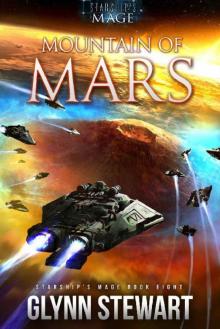 Mountain of Mars
Mountain of Mars Wardtown (Teer & Kard Book 1)
Wardtown (Teer & Kard Book 1) Noble's Honor (Changeling Blood Book 3)
Noble's Honor (Changeling Blood Book 3)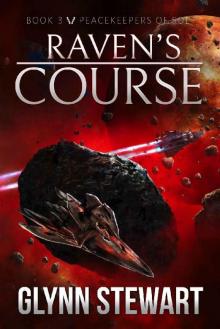 Raven's Course (Peacekeepers of Sol Book 3)
Raven's Course (Peacekeepers of Sol Book 3)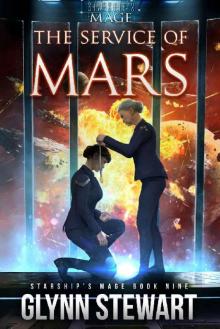 The Service of Mars
The Service of Mars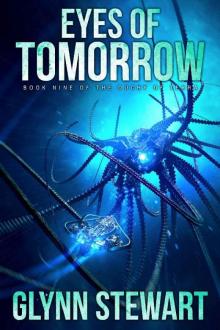 Eyes of Tomorrow (Duchy of Terra Book 9)
Eyes of Tomorrow (Duchy of Terra Book 9) Darkness Beyond (Light of Terra: a Duchy of Terra series Book 1)
Darkness Beyond (Light of Terra: a Duchy of Terra series Book 1) Drifter's Folly (Peacekeepers of Sol Book 4)
Drifter's Folly (Peacekeepers of Sol Book 4)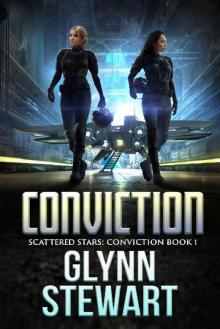 Conviction (Scattered Stars: Conviction Book 1)
Conviction (Scattered Stars: Conviction Book 1)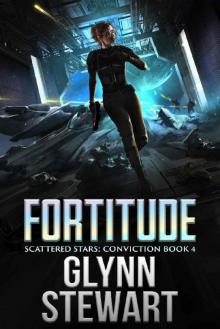 Fortitude (Scattered Stars: Conviction Book 4)
Fortitude (Scattered Stars: Conviction Book 4) Refuge
Refuge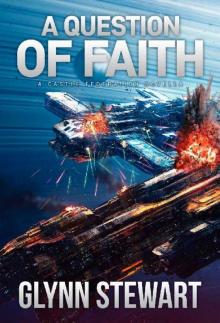 A Question of Faith: A Castle Federation Novella
A Question of Faith: A Castle Federation Novella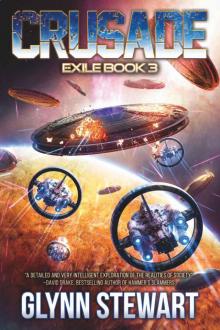 Crusade (Exile Book 3)
Crusade (Exile Book 3)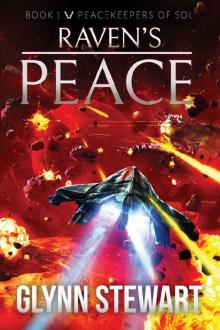 Raven's Peace
Raven's Peace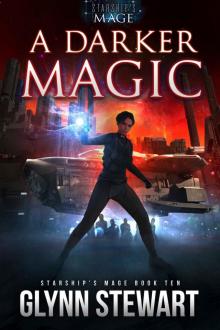 A Darker Magic (Starship's Mage Book 10)
A Darker Magic (Starship's Mage Book 10)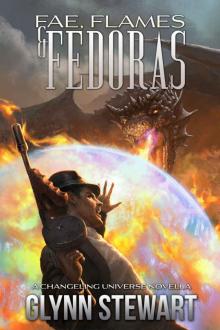 Fae, Flames & Fedoras
Fae, Flames & Fedoras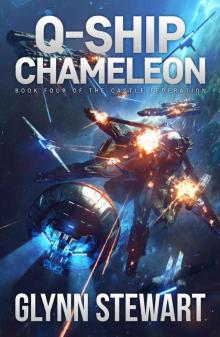 Q-Ship Chameleon
Q-Ship Chameleon Duchess of Terra (Duchy of Terra Book 2)
Duchess of Terra (Duchy of Terra Book 2)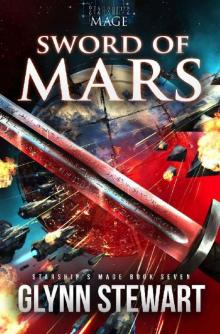 Sword of Mars
Sword of Mars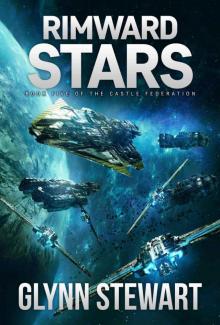 Rimward Stars (Castle Federation Book 5)
Rimward Stars (Castle Federation Book 5)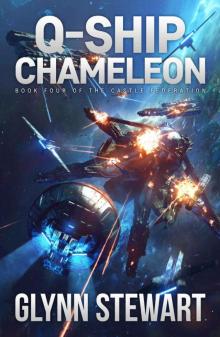 Q-Ship Chameleon (Castle Federation Book 4)
Q-Ship Chameleon (Castle Federation Book 4)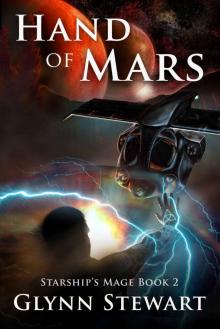 Hand of Mars (Starship's Mage Book 2)
Hand of Mars (Starship's Mage Book 2)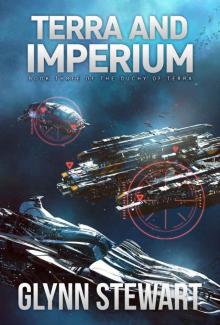 Terra and Imperium (Duchy of Terra Book 3)
Terra and Imperium (Duchy of Terra Book 3)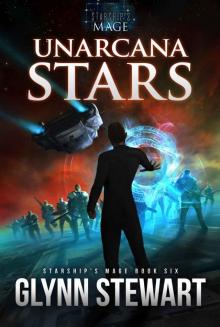 UnArcana Stars
UnArcana Stars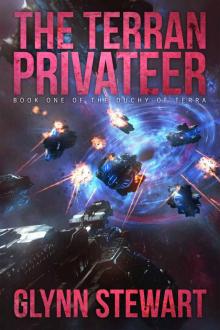 The Terran Privateer
The Terran Privateer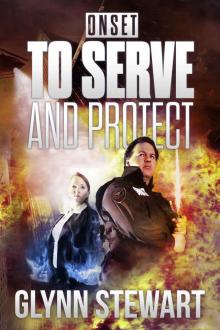 ONSET: To Serve and Protect
ONSET: To Serve and Protect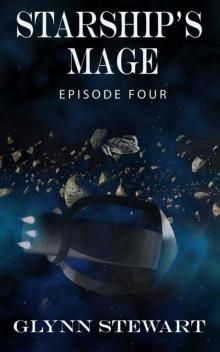 Starship's Mage: Episode 4
Starship's Mage: Episode 4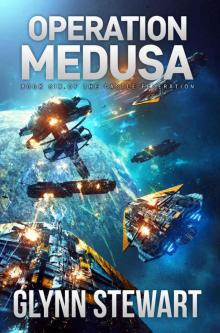 Operation Medusa (Castle Federation Book 6)
Operation Medusa (Castle Federation Book 6) ONSET: Blood of the Innocent
ONSET: Blood of the Innocent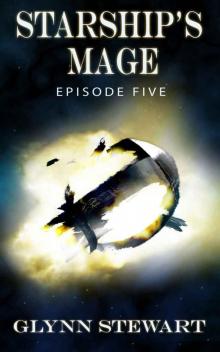 Starship's Mage: Episode 5
Starship's Mage: Episode 5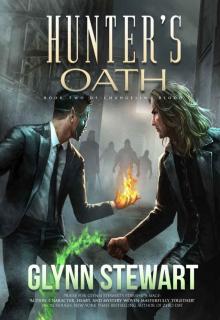 Hunter's Oath
Hunter's Oath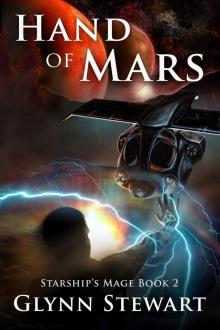 Starship's Mage 2 Hand of Mars
Starship's Mage 2 Hand of Mars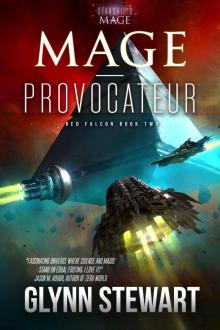 Mage-Provocateur (Starship's Mage: Red Falcon Book 2)
Mage-Provocateur (Starship's Mage: Red Falcon Book 2) ONSET: My Enemy's Enemy
ONSET: My Enemy's Enemy Blood Ward
Blood Ward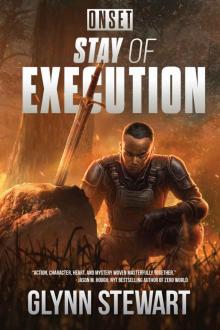 ONSET: Stay of Execution
ONSET: Stay of Execution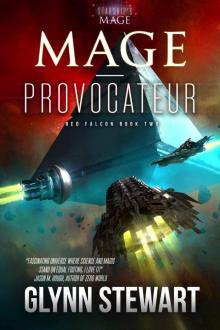 Mage-Provocateur
Mage-Provocateur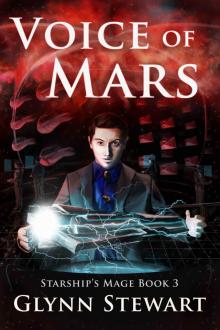 Voice of Mars (Starship's Mage Book 3)
Voice of Mars (Starship's Mage Book 3)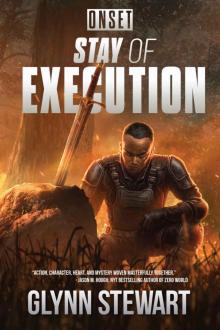 ONSET (Book 4): Stay of Execution
ONSET (Book 4): Stay of Execution Ashen Stars
Ashen Stars Children of Prophecy
Children of Prophecy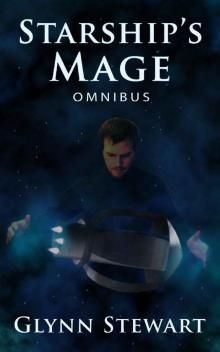 Starship's Mage: Omnibus: (Starship's Mage Book 1)
Starship's Mage: Omnibus: (Starship's Mage Book 1)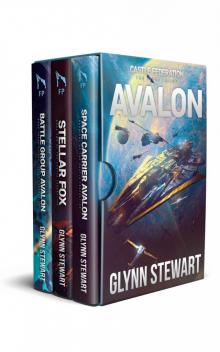 Avalon Trilogy: Castle Federation Books 1-3: Includes Space Carrier Avalon, Stellar Fox, and Battle Group Avalon
Avalon Trilogy: Castle Federation Books 1-3: Includes Space Carrier Avalon, Stellar Fox, and Battle Group Avalon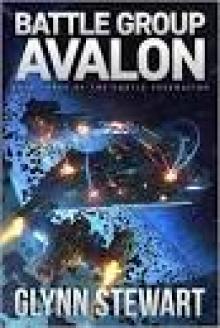 Battle Group Avalon (Castle Federation Book 3)
Battle Group Avalon (Castle Federation Book 3)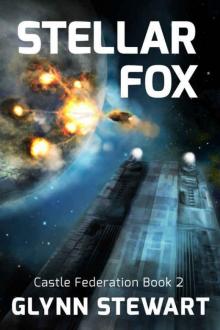 Stellar Fox (Castle Federation Book 2)
Stellar Fox (Castle Federation Book 2)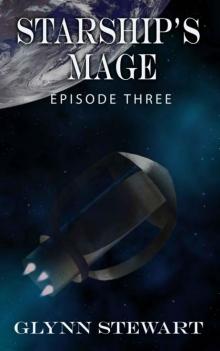 Starship's Mage: Episode 3
Starship's Mage: Episode 3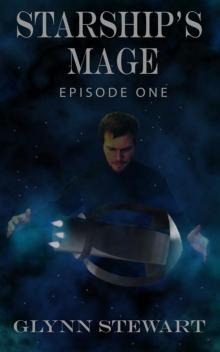 Starship's Mage: Episode 1
Starship's Mage: Episode 1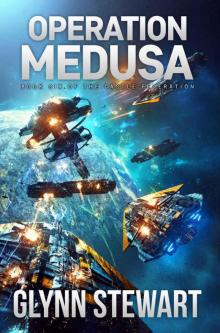 Operation Medusa
Operation Medusa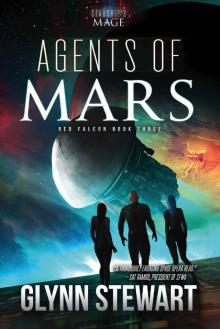 Agents of Mars (Starship's Mage: Red Falcon Book 3)
Agents of Mars (Starship's Mage: Red Falcon Book 3)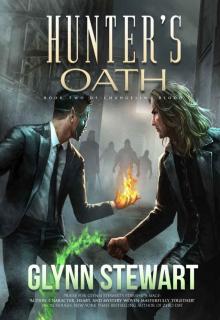 Hunter's Oath (Changeling Blood Book 2)
Hunter's Oath (Changeling Blood Book 2)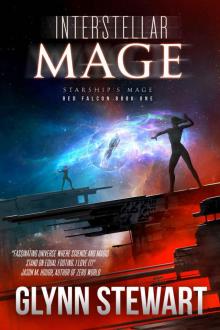 Interstellar Mage (Starship's Mage: Red Falcon Book 1)
Interstellar Mage (Starship's Mage: Red Falcon Book 1) Judgment of Mars (Starship's Mage Book 5)
Judgment of Mars (Starship's Mage Book 5) Alien Arcana (Starship's Mage Book 4)
Alien Arcana (Starship's Mage Book 4)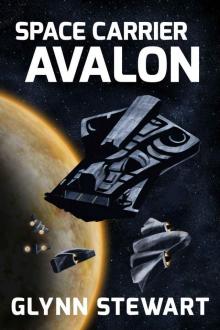 Space Carrier Avalon
Space Carrier Avalon Changeling's Fealty (Changeling Blood Book 1)
Changeling's Fealty (Changeling Blood Book 1)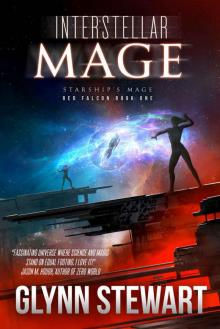 Interstellar Mage
Interstellar Mage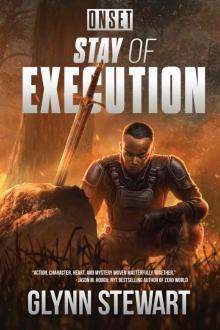 Stay of Execution
Stay of Execution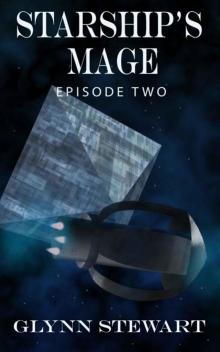 Starship's Mage: Episode 2
Starship's Mage: Episode 2